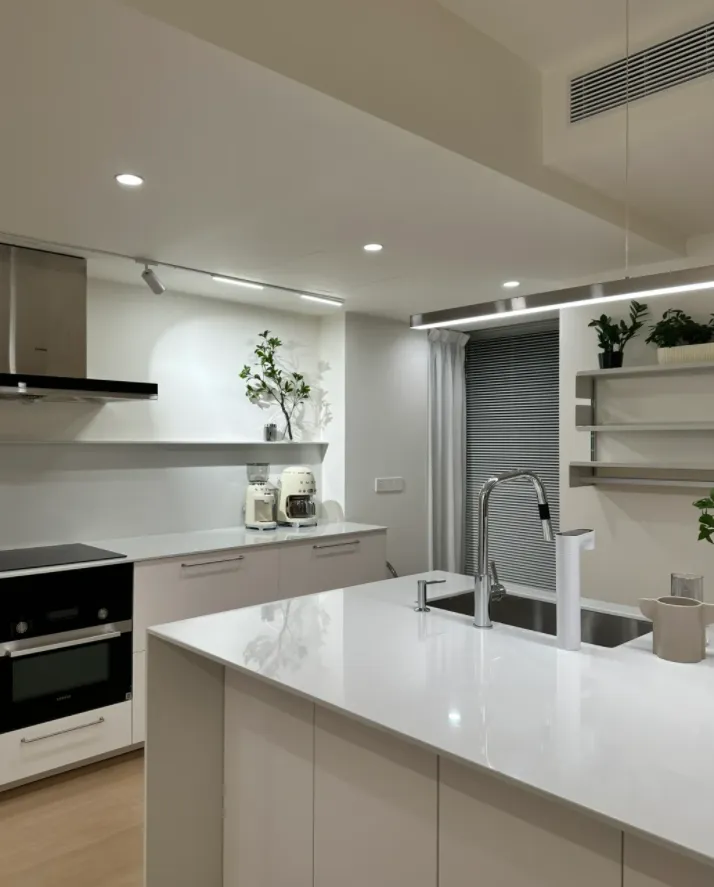The kitchen is the heart of the home—a space where stories are shared, meals are created, and memories are forged. Selecting the appropriate countertop material is crucial whether your project calls for a complete kitchen makeover or only cosmetic enhancement. Given so many choices, though, how do you decide? Two top contenders that cause discussion are quartzite and quartz. Let’s explore their variations to enable you to identify the ideal fit for your location.

Quartzite and Quartz: What’s the Story?
Quartzite and quartz may sound similar, but they are distinctly different materials. Although both are great options for bathroom or kitchen counters, their special features help them to be more suited for different purposes. See them as siblings with different personalities: one polished and refined, the other natural and tough. Let us investigate the unique qualities of every one of them.
What Exactly is Quartzite?
Quartzite is a natural stone, formed from sandstone subjected to intense heat and pressure deep within the Earth. It is a great candidate for counters since this process turns it into one of the toughest and most durable materials accessible. Natural veining and swirls in quartzite, which usually resembles marble with its sophisticated grey and white tones, define its beauty. This is the ideal approach to give any bathroom or kitchen classic elegance.
Advantages of Quartzite Countertops
Durability: Tough as nails, quartzite can withstand daily wear and tear.
UV Resistance: Perfect for sunlit spaces, as it won’t fade.
Marble-Like Appearance: Offers the beauty of marble without its fragility.
Unique Appeal: Every slab of quartzite is one of a kind.
Drawbacks of Quartzite Countertops
Scratch-Prone: Carelessness with sharp objects can leave marks.
Porosity: Without sealing, it’s vulnerable to stains.
Challenging Installation: Its density makes it tricky to handle.
Cost: Elegance doesn’t come cheap.

Quartz: Engineered for Convenience
Quartz, on the other hand, is a man-made material crafted from crushed natural quartz mixed with resin and pigments. It’s made to be consistent, low maintenance, and to provide a large range of colours and patterns. Unlike its natural equivalent, quartz offers a sleek, modern look that complements modern architecture rather brilliantly.
Advantages of Quartz Countertops
Non-Porous Surface: Easily fights bacteria and stains.
Stain Resistance: Perfect for messy cooks and families.
Design Flexibility: Comes in virtually any color or pattern.
Low Maintenance: An easy wipe keeps it spotless.
Drawbacks of Quartz Counters
Heat Sensitivity: Damage can result from hot pans.
Indoor Use Only: Over time UV light can discolour it.
Manufactured Look: Lacks the natural variation of stone.
Installation Complexity: Not ideal for DIY enthusiasts.
Which Countertop Wins?
Your lifestyle, design taste, and budget will all determine whether you choose quartzite or another material. Let us dissect it still further.
Appearance
Quartzite’s natural beauty is hard to beat. Its organic patterns and veining produce an original look impossible to copy. But quartz provides unparalleled diversity; designs ranging from solid colours to complex patterns mimicking natural stone. If you value uniqueness, quartzite is your best choice; for homogeneity and custom options, quartz rules absolutely.
Maintenance
If you’re looking for a low-maintenance option, quartz steals the show. It resists like a champ, is easy to clean, and calls for no sealing. Natural stone, quartzite, requires more maintenance. Regular sealing helps to avoid staining; acidic cleaners are off-limits. Think on your cleaning practices before deciding on anything.
Durability
Both materials are durable, but quartzite edges out quartz in hardness and heat resistance. Quartzite can withstand temperatures up to 1,000°F; quartz peaks at about 300°F. Still, quartz’s non-porous character helps it to resist stains and scratches.
Cost
Quartzite is generally pricier than quartz, with costs ranging from $65 to $190 per square foot, including installation. Though not inexpensive, quartz usually runs between $60 and $150 per square foot. Should financial restrictions be a factor, quartz presents a more reasonably priced substitute without compromising design.

There’s no wrong choice here—only the right choice for you. If you give natural beauty and heat resistance top priority, quartzite is the choice. Quartz is your best choice, though, if you want low maintenance, adaptability, and a contemporary look. For years to come, both materials will enhance the appearance and utility of your bathroom or kitchen. Whatever your decision, your new counters will surely take front stage in many events and treasured memories.






